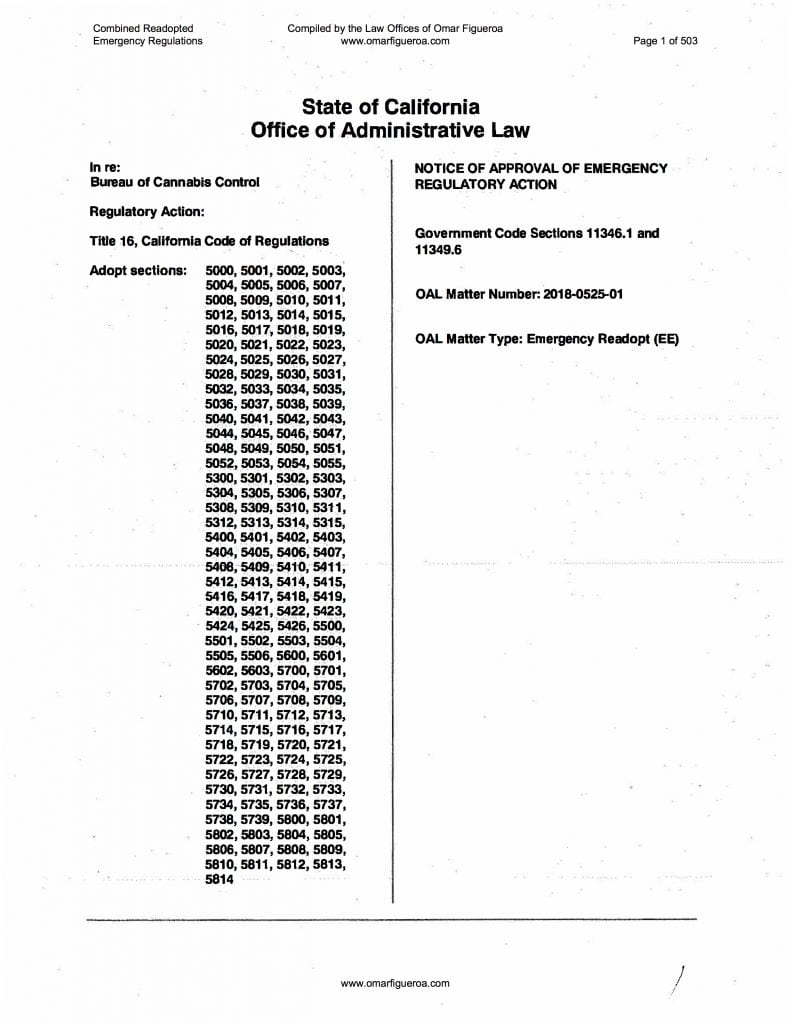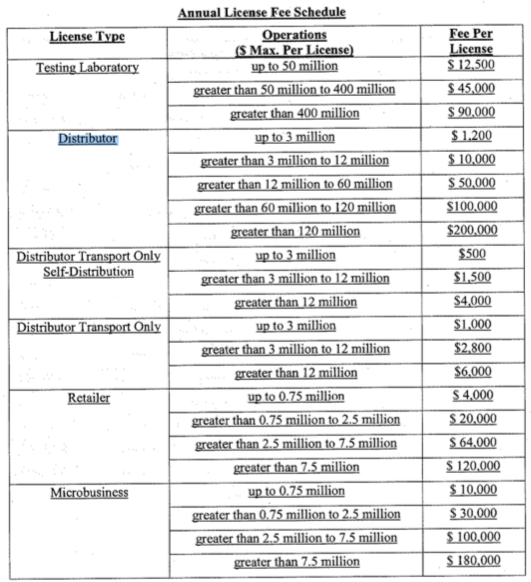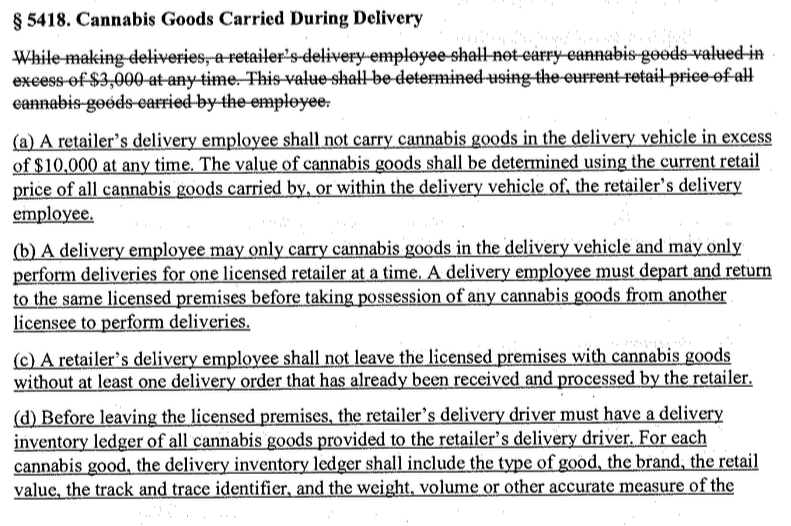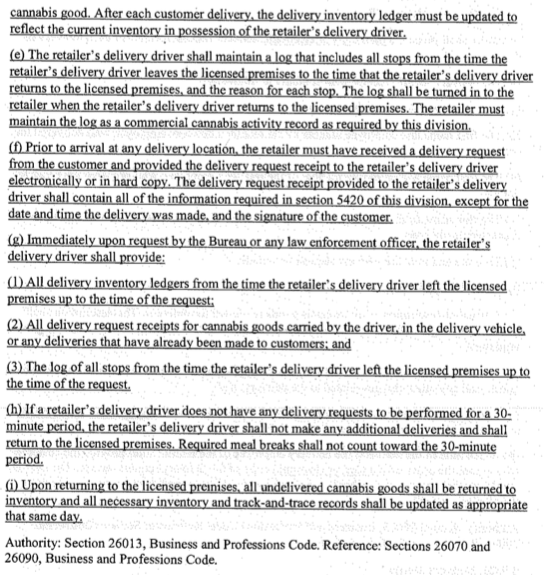Analysis of Readopted Emergency Cannabis Regulations
June 7, 2018 – On June 6, 2018, the emergency commercial cannabis regulations promulgated by the primary cannabis regulatory agencies (the Bureau of Cannabis Control, the Department of Public Health, and the Department of Food and Agriculture ) went into effect after being approved by the California Office of Administrative Law (OAL). Notably, many last-minute changes — both technical and substantive — to the agencies’ initial proposals were made.
For your convenience, we have combined all three sets of regulations into a handy slim-size PDF. They can be downloaded by clicking the link below:
Combined Readopted Emergency Regulations
On June 7, 2018, the Bureau of Cannabis Control issued three helpful documents: a Readoption of Emergency Regulations Factsheet, a Re-Adoption Summary of Changes, and a Transition Period Fact Sheet.
The newly-readopted emergency cannabis regulations are mostly the same as the initial emergency regulations adopted in November 2017, which the industry has been operating under since they went into effect in January 2018. However, there are some key differences and some new additions, many of which are discussed below. (The list below is not exhaustive; please contact a licensed California attorney for legal advice specific to your particular situation.)
Changes Applicable to All Licensees
- Allowing “M” (medicinal) & “A” (adult-use) licensees to conduct business with each other indefinitely regardless of their “M” or “A” designation. This eliminates the need for licensees to obtain two licenses for medicinal and adult-use versions of the same activity, with the exception of retailers who must still obtain both an “M” and an “A” license if they wish to serve both medicinal and adult-use customers.
- Replacing two license applications with one, if an applicant desires both an “M” and “A” license for the same activity. (This will streamline the process and eliminate duplicative applications.) If a licensee desires to add a designation to their license afterwards, the licensee must notify the licensing agency.
Bureau of Cannabis Control
- A licensed premises cannot be located within a private residence.
- Many licensing fees and schedules have been modified. For example, the license fee for a testing laboratory which expects to test up to $50 million worth of product per year has been reduced from $20,000 to $12,500. Similarly, the transport-only distributor license fee schedule has been completely modified. Previously, a transport-only distributor which expected to distribute up to $2 million worth of product per year was required to pay a license fee of $800, and a transport-only distributor which expected to distribute more than $2 million and up to $8 million worth of product per year was required to pay a license fee of $2,500. (A transport-only distributor which expected to distribute $8 million or more worth of product per year was not eligible for a transport-only distributor license, and had to apply for a full-service distributor license.) Now, another tier has been added, and a transport-only distributor which expects to distribute up to $3 million worth of product per year is required to pay a license fee of $1,000, a transport-only distributor which expects to distribute more than $3 million and up to $12 million worth of product per year is required to pay a license fee of $2,800, and a transport-only distributor which expects to distribute more than $12 million worth of product per year is required to pay a license fee of $6,000.
- Significant changes have been made to regulations pertaining to non-storefront delivery-only retailers. Under the newly re-adopted emergency regulations, delivery employees are required to verify the age and identity of the delivery customer prior to providing cannabis goods. Up to $10,000 of cannabis goods may be carried in a retail delivery vehicle at one time (compared to the prior limit of $3,000). A delivery driver can only perform deliveries for one retailer at a time, and must depart and return to the same licensed retail premises before taking possession of any cannabis goods from any other licensee to perform deliveries. Delivery drivers only need to receive and process at least one order before leaving the licensed premises, and can take new orders while on the road. This approach has been dubbed the “ice cream truck” or “dynamic” model of delivery. Additionally, numerous record-keeping requirements have been added, including maintaining a delivery inventory ledger which must be kept up-to-date, documenting all stops in a log, and keeping receipts of delivery requests.
- On-site security personnel will not be required 24/7. The Bureau had initially proposed this for storefront retailers and microbusinesses. Non-storefront retailers do not need to have security personnel.
- The category of people who could qualify as an “owner” of a cannabis business for licensing purposes was expanded. (i) The trustee in control of a trust that holds a commercial cannabis business and/or the commercial cannabis business held by a trust is considered an owner for licensing purposes. An individual who assumes responsibility for a cannabis license is also considered an owner. (ii) When an entity holds at least 20% ownership in a cannabis business, the CEO and members of the board of that entity shall be considered owners for licensing purposes. (iii) An agreement to receive a portion of the profits of a cannabis business is considered a “financial interest in a commercial cannabis business.”
- The annual licensing fee is now due when the Bureau approves of an annual license application. The annual license will not be issued until the licensing fee has been paid.
- Some rules for labeling the premises diagram have been modified, requiring identification of areas used for storage, batch sampling, loading and unloading of shipments, packaging and labeling, customers sales, loading for deliveries, extraction, cultivation, and processing, if available.

- The newly readopted emergency regulations explicitly allow for bathrooms, hallways, lobbies and break-rooms to be shared between licensees whose premises are located in the same facility.

- Licensees do not need to notify the Bureau when updating their Standard Operating Procedures. However, licensees do need to maintain copies of their current and prior SOPs.

- Licensees transporting cannabis goods within the same building or on the same parcel of land may do so by foot, hand-truck, fork lift, or other similar non-vehicular means. A compliant shipping manifest still must accompany this transport.

Department of Food & Agriculture
- Critically for outdoor cultivators who use light deprivation techniques to induce flowering, the final readopted emergency regulations do not automatically classify all cultivation utilizing light deprivation techniques as “mixed light cultivation.” Instead, the final readopted emergency regulations distinguish between light deprivation without the use of artificial light (which is properly classified as outdoor cultivation) and light deprivation utilizing artificial light (which is classified as “Mixed-light Tier 1” or “Mixed-light Tier 2” depending on the wattage per square foot.)
 Given that license fees for Outdoor cultivation licenses are less than half of the licensee fees for Mixed-Light cultivation licenses, this change is significant for legacy cultivators struggling during the transition period.
Given that license fees for Outdoor cultivation licenses are less than half of the licensee fees for Mixed-Light cultivation licenses, this change is significant for legacy cultivators struggling during the transition period. 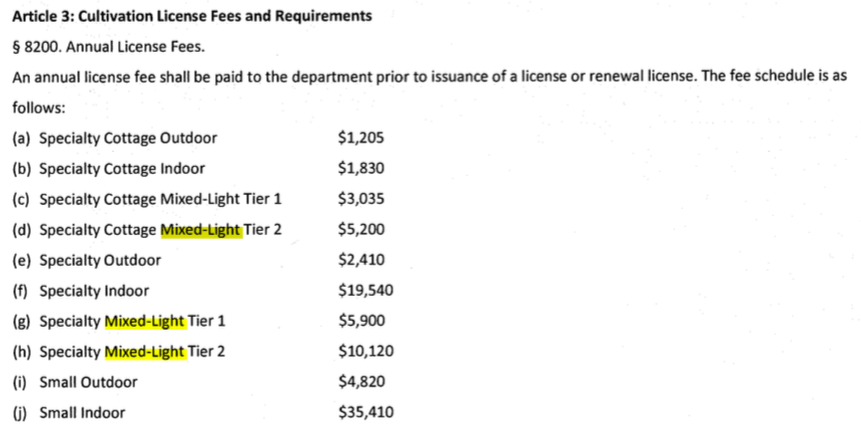
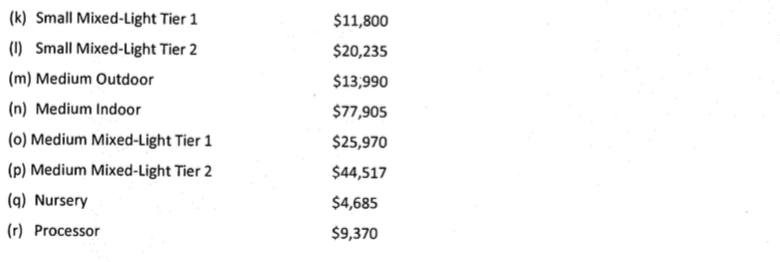 This last-minute change in the emergency cultivation regulations shows that public comments can have a significant impact. On this point, the Law Offices of Omar Figueroa submitted a comment addressing this precise issue:
This last-minute change in the emergency cultivation regulations shows that public comments can have a significant impact. On this point, the Law Offices of Omar Figueroa submitted a comment addressing this precise issue: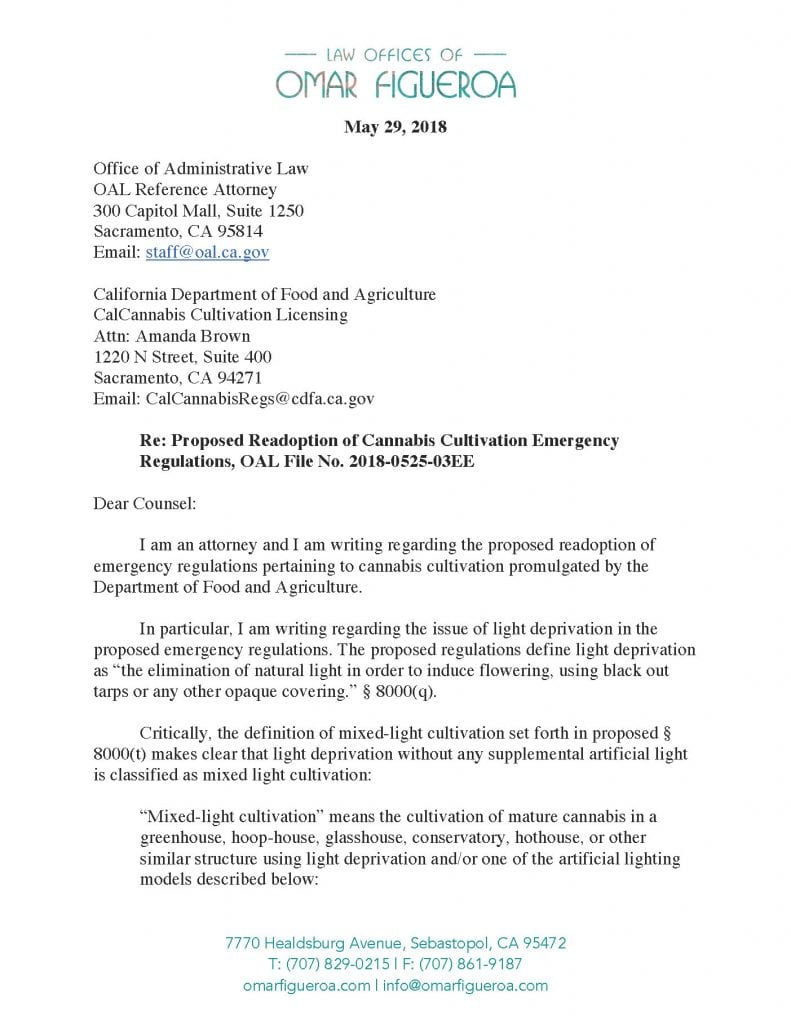
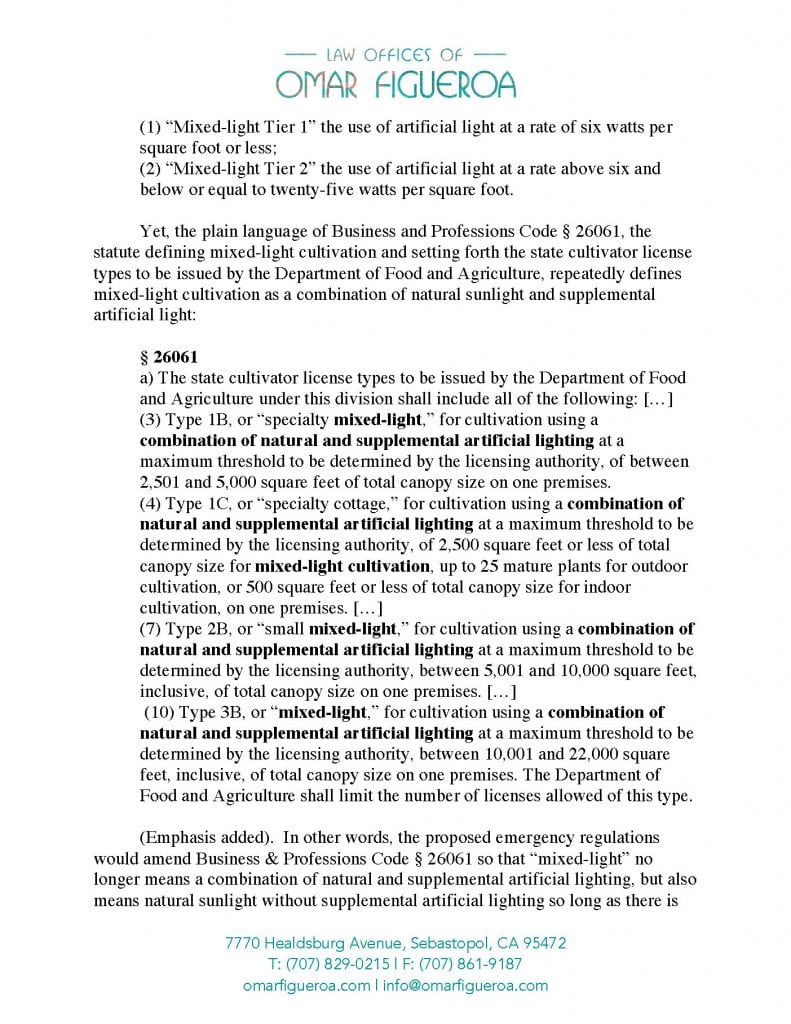
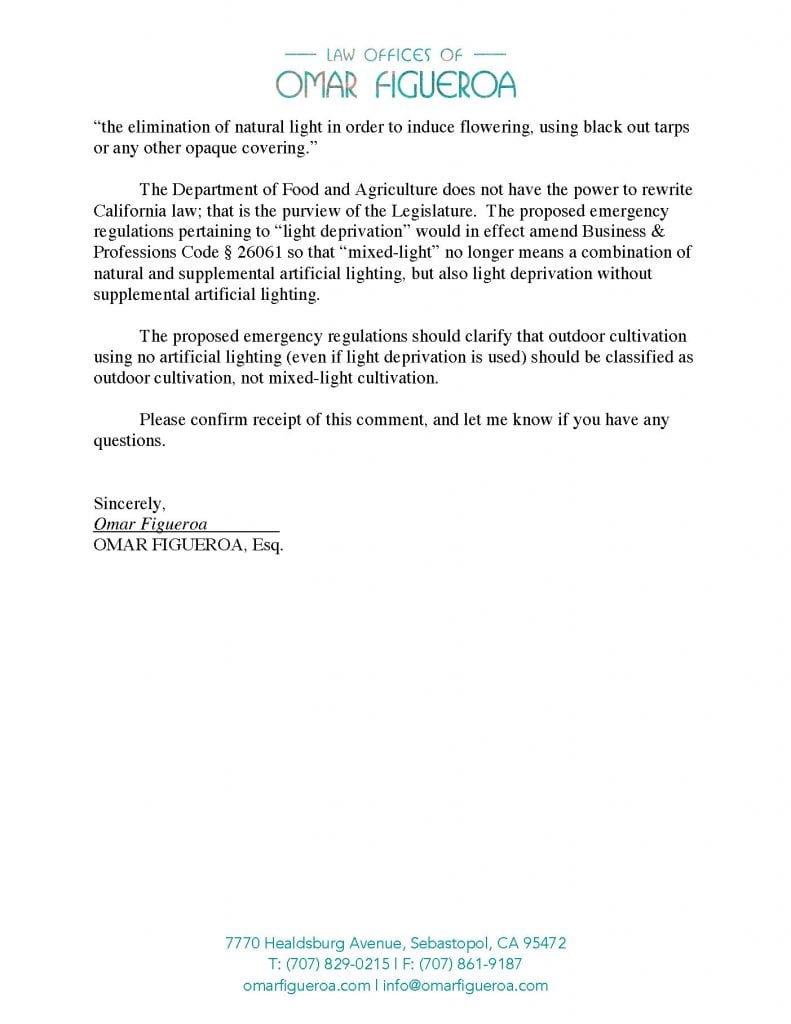
- Specifies that CDFA may take on the duties of a county sealer if that county sealer is unable or not required to register test and seal weighing devices used by a licensee for commercial purposes, and will charge a fee for this service.
- Licensees do not have to provide CDFA with information from a hired or contracted waste hauling agency, but must obtain and retain this information should CDFA ask to see it.
- Inspections, investigations, and audits of the licensed premises can be conducted at any time, or as otherwise agreed to by the department and the licensee or its agents, employees, or representatives. (The original emergency regulations limited this to “standard business hours or at other reasonable times as mutually agreed to by the department and the licensee.”)
- Much more additional information (including a proposed cultivation plan, evidence of Water Board and CDFW compliance, and water source information) is needed to apply for a temporary cultivation license.
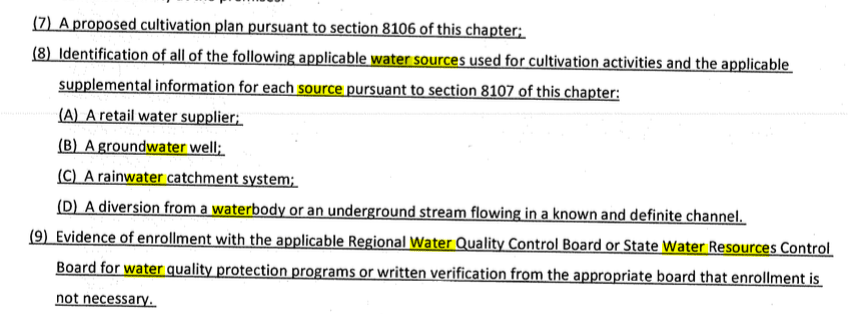
Department of Public Health
- Regulations concerning “Type S” (shared-use facilities) licenses have been formally added. For “Type S” licenses, there is a $500 application fee in addition to a license fee based on annual gross revenue.
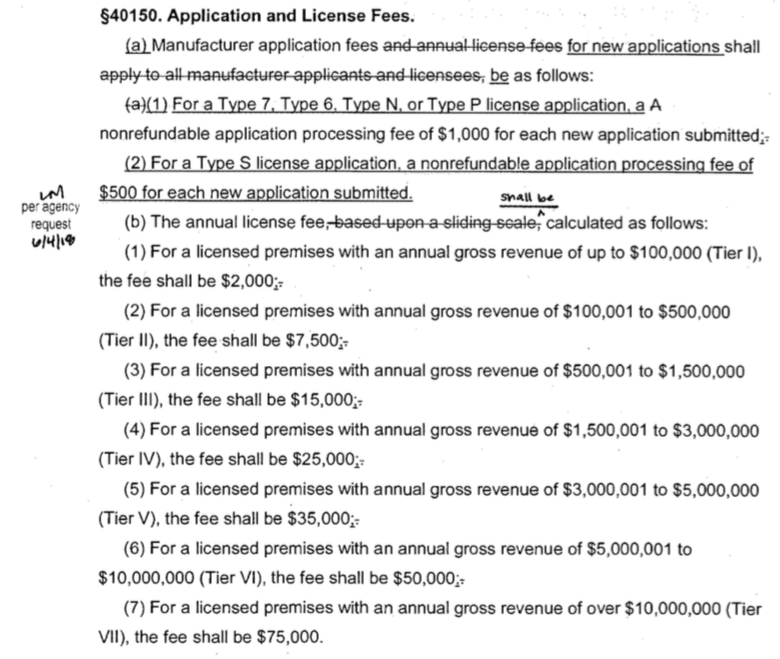
- Tinctures that do not meet the definition of an “alcoholic beverage” under Business and Professions Code §23004 are not prohibited.
 Business and Professions Code §23004 defines an alcoholic beverage as follows:
Business and Professions Code §23004 defines an alcoholic beverage as follows:
“Alcoholic beverage” includes alcohol, spirits, liquor, wine, beer, and every liquid or solid containing alcohol, spirits, wine, or beer, and which contains one-half of 1 percent or more of alcohol by volume and which is fit for beverage purposes either alone or when diluted, mixed, or combined with other substances. “Alcoholic beverage” does not include “powdered alcohol,” as defined in Section 23003.1.”
- Specifies that the license fee for the first year of licensure shall be based on the estimated gross annual revenue submitted in the manufacturing license application as specified in Section 40131.
- Rules for cannabis juice processing apply to other cannabis-infused beverages, such as infused soda. Manufacturers of cannabis-infused beverages must prepare a written juice hazard analysis plan.
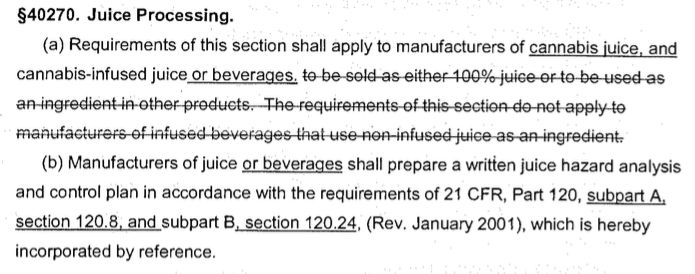
This blog post is provided as a public service and is not intended as legal advice. For specific legal questions, contact us at (707) 829-0215 or info@omarfigueroa.com to set up a confidential legal consultation.


